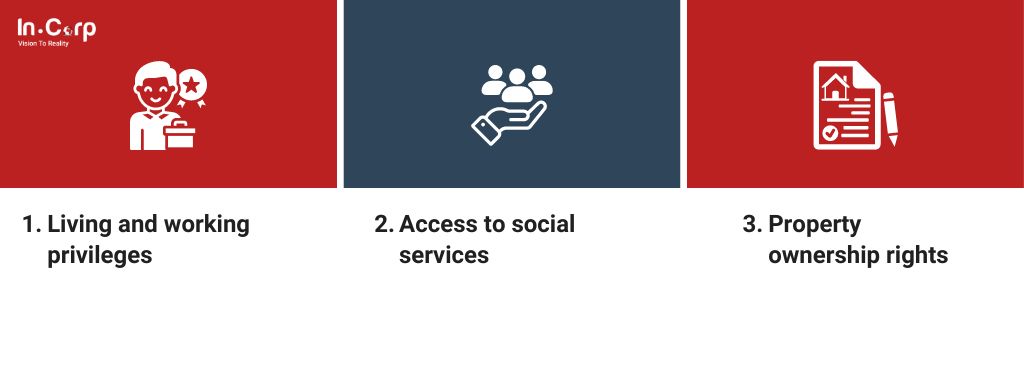The Indonesian government has unveiled a dedicated Visa for Diaspora Indonesia. It serves as a conduit; the new type of multiple-entry visa enables former Indonesian citizens to understand their roots and actively participate in developing their home country.
This multi-entry visa has numerous advantages, including prolonged validity and a streamlined application process. Therefore, the new limited-stay visa will give foreigners in Indonesia the freedom to live and work without constraints
What is the Indonesian Diaspora Visa?
Visa for diaspora Indonesia represents a new visa category in Indonesia, streamlining the repatriation process and facilitating long-term stays for Indonesian expatriates.
This visa offers several advantages compared to traditional visas, including:
5 or 10 years validity
Holders of a Diaspora Visa can stay there for up to 5 or 10 years without needing visa renewal.
No sponsorship required
Unlike other visas, visa for diaspora Indonesia eliminate the need for a sponsor or guarantor.
Multiple entry and exit privileges
Those with a Diaspora Visa in Indonesia enjoy the flexibility of multiple entries and exits without the requirement of applying for a new visa each time.
What are the eligibility criteria for a Diaspora Visa in Indonesia?

As you embark on your Indonesian adventure, consider securing a visa for diaspora Indonesia to streamline your stay and unlock exclusive benefits. To ensure eligibility, you must meet the following criteria:
- Indonesian citizenship: Hold current or former Indonesian citizenship.
- Overseas residence: Have resided abroad for at least five years.
- Valid passport: Possess a valid passport with a minimum validity of twelve months.
- Financial stability: Demonstrate sufficient financial means to support yourself in Indonesia.
- Commitment to Indonesia: Demonstrate a commitment to contributing to Indonesia’s development.
Essential Documentation to apply visa for diaspora Indonesia:
- Proof of living expenses: Provide documentation to support your living expenses in Indonesia.
- Passport photo: Submit a recent colored passport-sized photograph.
- Commitment statement: Within 90 days of arrival, provide a commitment statement in the form of an investment in Indonesian government bonds, shares/mutual funds in public Indonesian companies, or savings/deposits amounting to US$35,000.
- Proof of previous Indonesian citizenship: Establish your citizenship by presenting an identification card, birth certificate, family card, Republic of Indonesia passport, diploma, or certificate.
Read more: Indonesia officially introduces the Golden Visa
How to obtain a Diaspora Visa in Indonesia
Obtaining a Diaspora Visa in Indonesia is a streamlined process that can be conveniently completed online. Follow these simple steps to venture on your Indonesian journey:
|
Steps |
Details |
| Create an e-visa account | Create an account on the official e-Visa website to initiate the application process. |
| Complete the online application form | Diligently fill out the online application form, providing accurate and complete information. |
| Gather and upload the required documents | Compile and upload the necessary documents, including your passport, proof of financial means, and a commitment letter. |
| Settle the application fee | Submit the application fee to complete the process. |
| Submit your application | Once all steps are completed, submit your application for review. |
What are the Documents Needed to Apply for Diaspora Visa Indonesia?
Here are the main documents needed for a Diaspora visa application in Indonesia:
- Completed application form: Downloadable from the Indonesian Directorate General of Immigration (DGI) website or filled online at https://evisa.imigrasi.go.id/
- Valid passport: Valid for at least 18 months beyond your intended arrival in Indonesia.
- Two passport-sized photos: Recent, colored, and with a white background.
- Proof of Indonesian descent: Birth certificate, marriage certificate of Indonesian parents/grandparents, or Certificate of Indonesian Nationality (SKWN).
- Proof of financial support: Bank statements showing a minimum balance of USD 1,500 per month for your stay or a sponsor’s letter.
- Medical certificate: This may be required based on your nationality and stay duration.
- Police clearance certificate: This may be required based on your nationality and stay duration.
Additional documents may be requested based on individual circumstances.
What are the benefits of having a Visa for Diaspora in Indonesia?
If you are seeking to obtain a Diaspora Visa in Indonesia, you may find it interesting to know that this type of visa comes with several benefits. These include:
1. Living and working privileges
Holders of a Diaspora Visa can freely live and work anywhere in Indonesia.
2. Access to social services
Enjoy access to Indonesian social services, encompassing healthcare and education.
3. Property ownership rights
Holders of a Diaspora Visa in Indonesia possess the right to purchase property there.
Which countries share similar Diaspora Visa programs with Indonesia?
Indonesia is taking steps to attract and engage with its diaspora by introducing a new visa program that follows the successful models of countries like India, Ireland, and Portugal that is visa for diaspora Indonesia.
Inspired by India’s Overseas Citizen of India (OCI) program, Indonesia’s new diaspora visa aims to replicate its success and boost its economy.
These programs offer multiple-entry visas, property ownership rights, and investment opportunities, effectively bringing diaspora members back to their home countries and promoting economic growth.
Indonesia hopes to encourage its diaspora to return, invest, and contribute to its development by providing similar benefits and incentives with this visa for diaspora Indonesia.
Diaspora Visa vs. Multiple Entry Visa
Planning a return to Indonesia or frequent visits? Understanding the difference between a Diaspora Visa and a Multiple Entry Visa can help you choose the most suitable option for your needs.
Diaspora Visa
The Diaspora Visa is created specifically for Indonesians residing outside the country who wish to come back and contribute to the Indonesian economy. This visa provides the opportunity for extended stays in Indonesia and comes with two validity options: 5 or 10 years.
You can simplify the settling-in process by obtaining a residence permit upon arrival. To apply, you need to submit the applications electronically through the Evisa portal, for a faster and more convenient experience. By choosing the Diaspora Visa, you’re not only securing your stay but also potentially contributing to Indonesia’s development.
Multiple Entry Visa
Various types of Multiple Entry Visas are available for frequent stays in Indonesia, catering to different purposes such as tourism and business.
- Social/Tourism Visa: This visa is valid for one year, allowing a maximum stay of 60 days per visit, making it perfect for frequent leisure trips to Indonesia.
- Business Visa: Choose from options with 1, 2, or 5-year validity. Each visit allows a maximum stay of 60 days and can be extended twice for an additional 60 days each. This visa is ideal for frequent business travelers.
The application process for obtaining Multiple Entry Visas can vary depending on your nationality and the type of visa you need. Social/Tourism Visas can often be obtained electronically through evisa.imigrasi.go.id.
Applying for a business visa in Indonesia can be done either through the Indonesian embassy/consulate or online, depending on the visa duration and individual circumstances.
Choosing the Right Visa
If you are an Indonesian citizen living abroad and plan to return to Indonesia for a long-term investment, the Diaspora Visa is an ideal option. A multiple-entry visa is suitable for frequent short visits for tourism or business. When choosing the visa, consider the validity period and maximum stay durations.
Read more: How to apply for Indonesian Tourist Visa?
How does Indonesia’s Visa for Diaspora contribute to the nation?
Indonesia has a vast diaspora spread across more than 60 countries, with significant concentrations in Malaysia, Singapore, Australia, Saudi Arabia, the Netherlands, and the United States.
This global network of Indonesian diaspora is a valuable source of talent, expertise, and resources that Indonesia can strategically leverage to fuel its development and growth.
By developing stronger ties with diaspora members, Indonesia can unlock its potential to drive economic, social, and cultural progress for the nation.
Not only that, The visa diaspora effect in Indonesia has played a significant role in stimulating the country’s economy. By facilitating the entry of diaspora members through the Indonesian Diaspora Visa, the government has successfully encouraged investments, knowledge transfer, and entrepreneurship. This has resulted in a positive impact on various sectors, contributing to the overall growth and development of the Indonesian economy.
How does the government support the visa for diaspora in Indonesia program?
The Indonesian government has launched programs to encourage the return of its citizens living abroad.
- The Diaspora Support Program offers financial and logistical aid to those planning their return to Indonesia.
- The Diaspora Investment Program incentivizes Indonesian citizens to invest in the country.
- The Diaspora Knowledge Network fosters connections between Indonesian citizens abroad and businesses and institutions within Indonesia.
Simplify your Diaspora Visa application process with InCorp Indonesia
Navigate your return journey effortlessly with our skilled consultants guiding you through each step, guaranteeing your visa application’s accuracy, completeness, and timely submission.
Benefit from our decade-long experience and a broad network within InCorp Global Group, where we’ve successfully aided countless clients in securing visas for various purposes.
Reach out today for a free consultation to streamline your visa application – click the button below.
Get in touch with us.
What you'll get
A prompt response to your inquiry
Knowledge for doing business from local experts
Ongoing support for your business
Disclaimer
The information is provided by PT. Cekindo Business International (“InCorp Indonesia/ we”) for general purpose only and we make no representations or warranties of any kind.
We do not act as an authorized government or non-government provider for official documents and services, which is issued by the Government of the Republic of Indonesia or its appointed officials. We do not promote any official government document or services of the Government of the Republic of Indonesia, including but not limited to, business identifiers, health and welfare assistance programs and benefits, unclaimed tax rebate, electronic travel visa and authorization, passports in this website.




